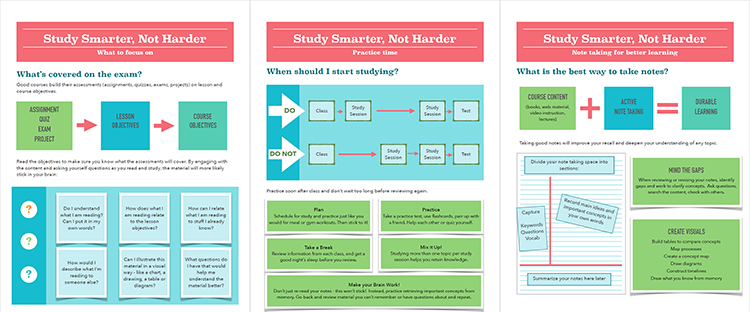Click the image below to download PDF files of these Study Skills handouts.
Study Smarter, Not Harder: What to focus on
What's covered on the exam?
Good courses build their assessments (assignments, quizzes, exams, projects) on lesson and course objectives.
Lesson objectives should support course objectives, and assignments, quizzes, exams, projects, etc., should align with lesson and course objectives.
Read the objectives to make sure you know what the assessments will cover. By engaging with the content and asking yourself questions as you read and study, the material will more likely stick in your brain:
- Do I understand what I am reading? Can I put it in my own words?
- How does what I am reading relate to the lesson objectives?
- How can I relate what I am reading to stuff I already know?
- How would I describe what I'm reading to someone else?
- Can I illustrate this material in a visual way - like a chart, a drawing, a table or diagram?
- What questions do I have that would help me understand the material better?
Study Smarter, Not Harder: Practice time
When should I start studying?
Do study soon after initial learning, though not immediately after class -- take a break (maybe 24 hours)before reviewing. Study again after another break and before the test. Do not wait for a long time (several days, or weeks) after initial learning to begin reviewing and then taking a test. Basically, Practice soon after class and don't wait too long before reviewing again.
Plan Schedule for study and practice just like you would for meal or gym workouts. Then stick to it!
Practice Take a practice test, use flashcards, pair up with a friend. Help each other or quiz yourself.
Take a Break Review information from each class, and get a good night's sleep before you review.
Mix it Up! Studying more than one topic per study session helps you retain knowledge
Make your Brain Work!Don't just re-read your notes - this won't stick! Instead, practice retrieving important concepts from memory. Go back and review material you can't remember or have questions about and repeat.
Study Smarter, Not Harder: Note taking for better learning
What is the best way to take notes?
Course content (books, web material, video instruction, lectures, etc.) plus active note taking equals durable learning.
Taking good notes will improve your recall and deepen your understanding of any topic. Try dividing your note taking space into sections: in a large area, record main ideas nad importand concepts in your own words. In a smaller space, capture keywords, questions, and vocabulary. In another space, summarize your notes at a later time.
Mind the Gaps When reviewing or revising your notes, identify gaps and work to clarigy concepts. Ask questions, search the content, and check with others.
Create VisualsBuild tables to compare concepts, Map processes, Create a concept map, Draw diagrams, Construct timelines, Draw what you know from memory.
Resources for Further Investigation
Taking Notes
- Taking Notes: Crash Course Study Skills#1 (8:50 YouTube video)
- Cornell Note-taking Lined Paper PDF Generator
- Keep your notes organized with software (some free, others at minimal cost):
- Microsoft OneNote (free to PSU students),
- Evernote
- Using Evernote in Amazing Ways
- Google docs
- GoodNotes (app for iOS devices, has built-in templates)
- The Best Note-Taking Methods for College Students
- Oxford Learning:
- Cornell Method (Best for understanding key ideas and relationships)
- Mapping Method (Best for visualizing connected topics and ideas)
- Outlining Method (Best for easily creating study questions for review)
- Charting Method (Best for Reviewing lots of facts)
- A Simple Way to Better Remember Things: Draw and Picture (NYT article)
Flashcards
- Google slide/flashcards
- Quizlet Flashcards
- 8 Flashcard sites - Make your own!
Time-Scheduling
Sleeping
- The Learning Scientist's podcast on Sleep, Learning, and Self Care
- Improving Sleep from Dartmouth's Academic Skills Center
Dealing with Stress
- It's Hard to Study if You're Hungry by Dr. Sara Goldrick-Rab
- Record Numbers of College Students Are Seeking Treatment for Depression and Anxiety - But Schools Can't Keep Up by Katie Reilly
- Theories of work-related stress by Dr. Sally Pezaro
- Effect's of stress on college students' eating habits by Olivia Shackleton
- Charieties such as Mind and Student Minds (both in the UK) are working to provide resources for students who find themselves in difficult situations due to unmet needs
Research Resources
- Example (blog post) Trying out 6 study techniques
- The Learning Scientists' downloadable materials
References
- Brown, P. C. (2018). Make it Stick: The science of successful learning. S.l.: Belknap Harvard.
- Dunlosky, J, et al. (2013). Improving students’ learning with effective learning techniques: Promising directions from cognitive and educational psychology. Psychological Science in the Public Interest, 14(1), 4-58. http://doi.org/10.1177/1529100612453266
- How To Take Study Notes: 5 Effective Note Taking Methods. (2018, April 24). Retrieved from https://www.oxfordlearning.com/5-effective-note-taking-methods/
- Kuepper-Tetzel, C. (2018, July 05). Optimizing Your Learning Schedule. Retrieved from http://www.learningscientists.org/blog/2018/7/5-1
- McGuire, S. Y., & McGuire, S. (2016). Teach students how to learn: Strategies you can incorporate into any course to improve student metacognition, study skills, and motivation. Sterling: Stylus Publishing, LLC.
- Sumeracki, M., & Weinstein, Y. (2018). The Learning Scientists. Retrieved from http://www.learningscientists.org/
